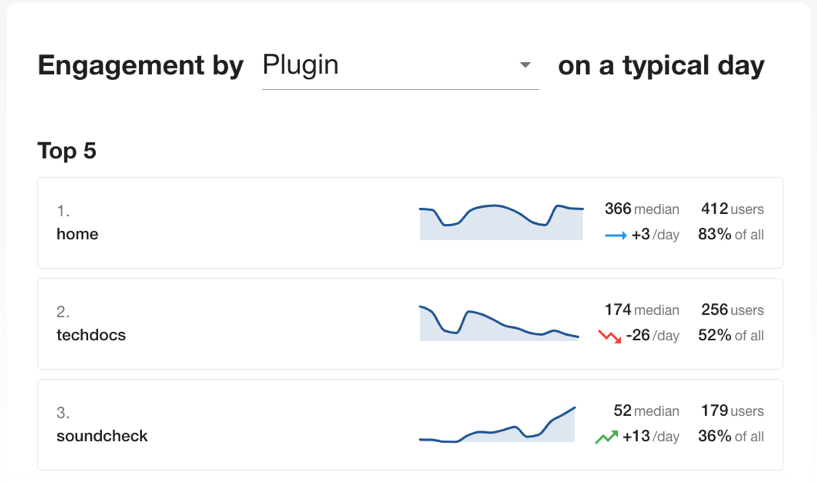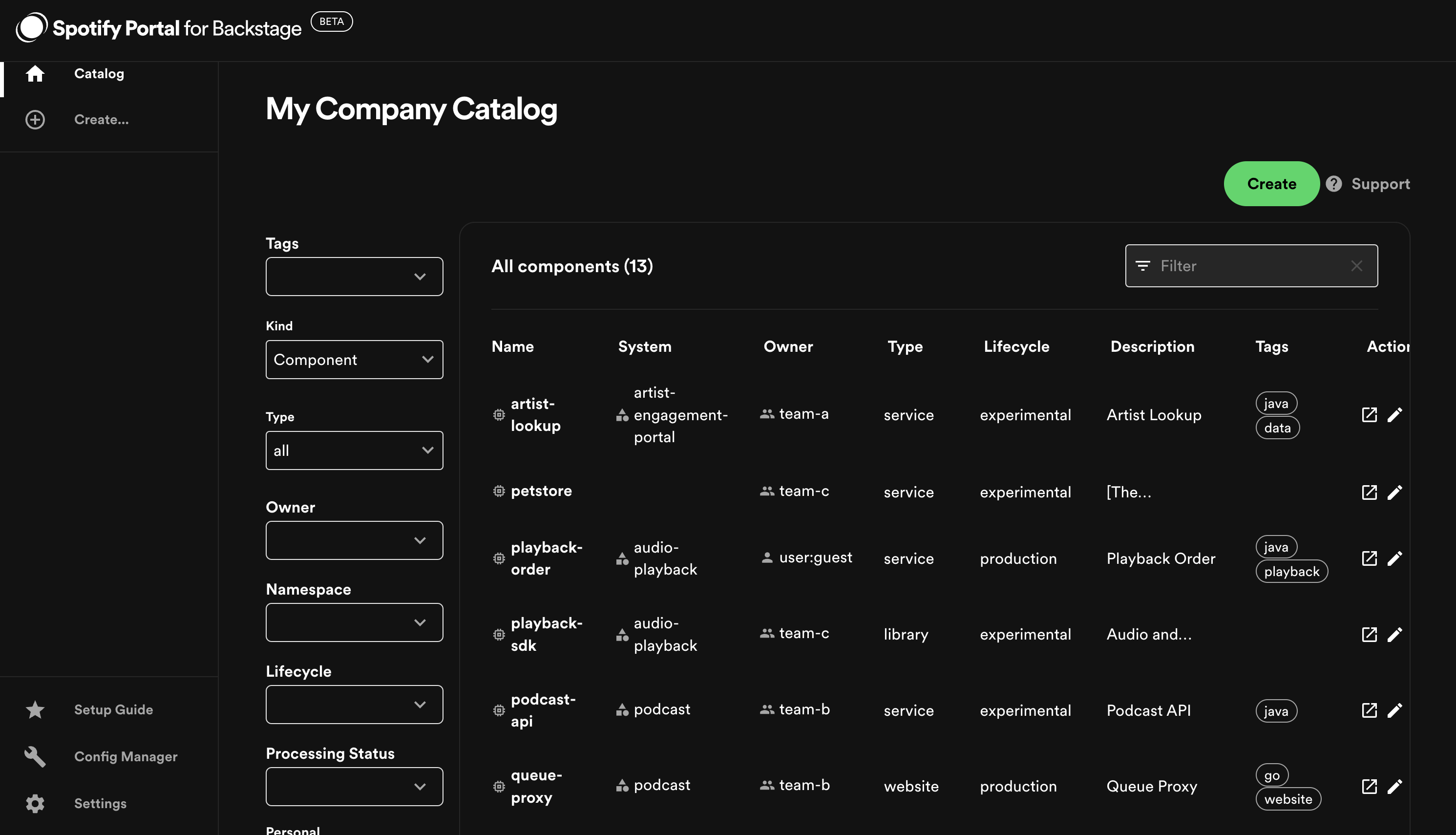You know that mildly jarring experience whenever that well-known celebrity shows up in an entirely different context — e.g. a musician making a horror flick cameo; an NFL player rearing their head in a comedy series; or a Hollywood movie icon selling mobile phone plans on TV? Well, it’s starting to feel like that with Spotify’s foray into the enterprise and developer tooling space — nothing wrong with it per se, but it makes you flinch just a little due to its divergence from the norm.
What we’re talking about is Backstage, a platform and framework Spotify introduced internally in 2016 to bring order to its developer infrastructure. Backstage powers customizable “developer portals” that combine tooling, apps, data, services, APIs and documents in a single interface. Want to monitor Kubernetes, check your CI/CD status or track security incidents? Backstage to the rescue.
Lots of companies construct their own internal systems to help developers work more efficiently. And lots of companies release such systems to the public via an open source license to spur wider adoption, as Spotify did with Backstage in 2020. But it’s highly unusual for a consumer technology company to actively monetize this side of its business, which Spotify has been doing since 2022.
Now, Spotify is leaning even further into this play with the launch of a new suite of products and services designed to make Backstage the de facto developer portal platform for the software development industry.
Spotify’s grand plan to monetize developers via its open source Backstage project
Modular
Backstage is built on a modular, plug-in based architecture that allows engineers to layer-up their developer portal to meet their own needs. There is already a thriving marketplace for Backstage plug-ins, some developed by Spotify itself and some by the wider community, including developers from Red Hat and Amazon Web Services (AWS) — AWS, for example, has developed a plug-in to make data from Amazon Elastic Container Service (ECS) available in Backstage.
Since late 2022, Spotify has been selling a handful of premium plug-ins as a subscription, such as Backstage Insights, which serves up data related to Backstage usage across an organization, including which plugins they’re engaging with most.

The open source Backstage project has been adopted internally by some of the world’s most well-known companies, including LinkedIn, Twilio, American Airlines, Unity, Splunk, Ikea, HP and more than 3,000 organizations. But as with just about any open source project, the main issue with Backstage is the complexity involved in getting set up — lots of integrations, configurations and figuring out how it all glues together.
Thus, Spotify is now introducing an out-the-box version of the open source project called Spotify Portal, available in beta from today, which is pitched as a “full-featured, low-/no-code internal developer portal (IDP)” built atop Backstage.

Spotify Portal ships with quick-start tools for connecting all their internal services and libraries, replete with setup wizard for installing Portal and connecting it with a company’s GitHub and cloud provider.
“When you set up your IDP, typically you need to ingest a lot of software into that, because the point of the IDP is to capture your full software catalogue and map that to the user base, and there’s potentially a lot of integrations involved in,” Tyson Singer, Spotify’s head of technology and platforms, explained to TechCrunch. “And so with Spotify Portal for Backstage, we’ve basically given folks a no-code way to do that.”

Getting SaaS-y?
On the surface, this seems like some sort of SaaS play, similar to how a commercial company might offer a fully managed, hosted version of a popular open source product. But that isn’t quite what’s happening here — there is no hosted element to this, though that might change in the future. It’s what Singer calls “Backstage in a box,” one which is deployed within the customer’s own ecosystem either on-premises, or in their own cloud.
“It’s the customer who manages it,” Singer said. “What’s important from our perspective is that we’ve really focused on both reducing the startup time and the maintenance time. So that means not only is the setup and the onboarding ‘no-code,’ it’s also the maintenance where we’re reducing code. That really makes it quite easy to manage in your own particular context.”
However, in a follow-up question, a Spotify spokesperson clarified that Spotify Portal for Backstage is its “first step towards a managed product,” which means that it more than likely will be offered more like a SaaS service in the future. “We’ve seen a growing appetite for a more managed product that would allow us to share our expertise more directly with companies, and we want to be able to offer more in support of that need,” the spokesperson said. “Portal is our first step on that journey, but in the future, we’re going to expand our offerings as managed.”
In addition, Spotify is adding various enterprise support and services to the mix, which it says it has already been providing since last summer but hasn’t disclosed this until now. This includes one-on-one tech support from dedicated Backstage personnel at Spotify, and includes service-level agreements (SLAs), security reviews and incident notifications. And for those wanting to get up-and-running with Backstage in the first instance, Spotify is also offering consulting services.
Spooling up
In essence, Spotify is now catering to three broad category of users: the core open source project for those with the resources and technical nous to self-deploy everything; the “hybrid adopters,” which is what Spotify calls those that have some of the necessary skills but need some support along the way; and the businesses that need something a bit more oven-baked — which is where Spotify Portal enters the fray.
Similar to the pricing structure for its existing plugin subscriptions, which are charged based on “individual customer parameters” such as usage and capacity, the new Portal and enterprise services don’t come with up-front costs.
“For pricing, we are referring customers back to our sales organization,” Singer said. “It’s custom pricing.”
Given this transition to an enterprise-focused developer tools company, Spotify is also having to staff-up accordingly, though Singer wouldn’t share how many people it would be hiring or allocating to these new support roles.
“We are changing how we go forward with both our sales organization and support,” Singer said. “So we’re shifting more focus towards how can we support customers in their initial journey and then also, once they’ve got it set up, their ongoing journey because we do want to be able to support them to get to value as quickly as possible.”
All this, it seems, is just the tip of the iceberg as far as Spotify’s developer tooling shift is concerned. The company is adding new features to some of its existing premium plug-ins, and it’s adding more plug-ins to the mix, too. One of these is the “data experience” plug-in, which makes it easier to add individual data entities to a software catalog — this includes built-in “ingestors” to scoop metadata from external data platforms, and make this available across Backstage.
Last year, Spotify also teased a totally separate product for software development teams called Confidence, which is like an A/B experimentation platform based on one of its own internal tools. For now, that remains a beta product, but Singer says that it’s “all systems go” as it readies things for prime-time in the future.
“We are super happy with the feedback that we’ve been getting from our [Confidence] beta customers so far,” Singer said. “We built out an experimentation platform that is broad and deep, covering a tremendous amount of use cases covering everything from your typical A/B testing on a user surface, to being able to do that across all of our ML [machine learning] use cases. And I think that really sets it aside, as more and more companies are using ML in the same sorts of ways that we are to optimize things.“






























Comment